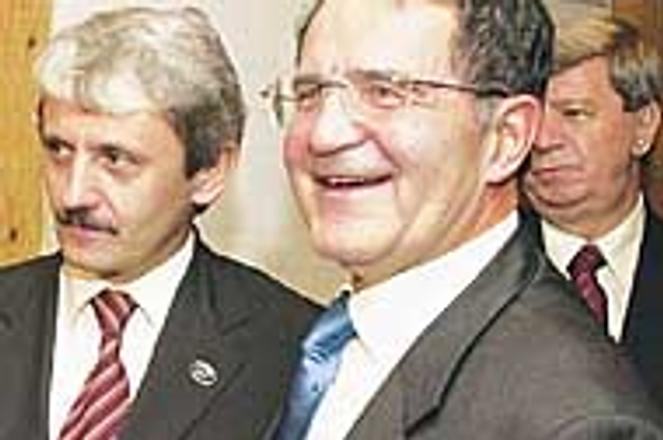PRIME MINISTER Mikuláš Dzurinda (centre) with European Comissioner for Enlargement Günter Verheugen (left) and European Commission president Romano Prodi at a post-summit meeting in Copenhagen.photo: TASR
LEADERS of all 15 European Union (EU) countries at a summit in Brussels formally accepted Slovakia as a prospective member, along with nine other candidate countries.
The accord struck at the summit on October 24 and 25 after hours of heated debate also clarified a number of financial issues relating to EU enlargement, including levels of farming and regional aid.
EU politicians concluded that all 10 candidate countries recommended for EU entry in 2004 should be able to conclude negotiations before a landmark summit in Copenhagen in mid-December. This removes one of the last obstacles to EU membership for Poland, the Czech Republic, Hungary, Slovakia, Slovenia, Estonia, Latvia, Lithuania, Cyprus and Malta.
"This is the beginning of the end of negotiations. [The candidates] can be pleased," said Danish Foreign Minister Per Stig Möller at an October 28 meeting of prime ministers from candidate countries organised in Copenhagen to brief future members on the conclusions of the Brussels summit.
While Slovakia has not applauded all the terms of the agreement reached in Brussels, senior politicians are maintaining a realistic outlook.
"We are not pleased with all proposals of the union, but it would be unfortunate to miss the most important thing, which is that EU enlargement [is going ahead]," said Slovak PM Mikuláš Dzurinda after the Copenhagen meeting.
According to Dzurinda, none of the candidate countries are happy with the suggested levels of farming aid or the so-called 'safeguard clauses', designed to penalize new members who fail to meet EU targets.
Direct payment of farming aid to new members in 2004 will be 25 per cent of the amount given to EU farmers, increasing annually until 2013, when the levels given to old and new members will be the same.
This decision has angered Slovak farmers.
"On the one hand we welcome the fact that after long discussions the EU countries have concluded that farmers in new member countries will need direct payments. On the other hand we cannot be pleased with the current proposal. We think it opens the door to discrimination against farmers and all businesses in member countries," said Stanislav Nemec, spokesperson for the Slovak Agriculture and Food Chamber.
Nemec added that domestic farmers will not be able to compete fairly with their foreign counterparts for whom production costs will be comparable but who will receive more financial support. He said this situation amounted to a violation of free-market principles.
In his view, the country should defend its farmers.
"If the EUß insists on its proposal, national governments will have to balance the amount of subsidies from their domestic budgets. I think the negotiators should try to establish that this amount, which the farmers will receive from the government instead of from Brussels, be deducted from the total amount contributed into the common European budget," said Nemec.
However, some analysts say the EU's current stand is only natural.
"Even the EU is all about money in the end," said Marek Senkovič, analyst for the Istrobanka bank.
"I cannot imagine how the governments of Germany, France or Spain would explain to their voters that they have to pay the Czechs, Hungarians and Slovaks several hundred or thousand euros every year," he added.
Acting alone, Slovakia was, and is, unable to change the set conditions, Senkovič pointed out.
"We are a small country, unimportant to the EU in all economic aspects. We could have prevented this situation by agreeing on a common procedure with Hungary, Poland, the Czech Republic and other countries. The problem is that even though they are alike in some ways, the countries are different in others, so a common stand could not be expected," said Senkovič.
Dzurinda ruled out the possibility of a coordinated procedure in the future.
"Entry into EU is not collective but individual," he said.
Slovak officials also expressed dissatisfaction with the safeguard clauses laid down in the Brussels accord. As well as a general economic safeguard clause, EU member leaders also agreed upon two specific safeguard clauses relating to the operation of the internal market, including all policies covering economic activities that would have a cross-border effect.
According to the Brussels agreement, a safeguard clause may be invoked upon the request of any member state for up to three years after accession.
Ján Figeľ, Slovakia's head negotiator with the EU, said he was disappointed with the safeguard measures decided upon in Brussels.
"The extension [of the safeguard clauses] to three years indicates certain worries about candidate countries' ability to be prepared in all areas," he said.
But despite the bickering provoked by the Brussels accord, which analysts believe will continue until December's meeting in Copenhagen, Istrobanka bank's Senkovič believes Slovakia should be pleased with the results of the summit overall.
"I think the [agreement] is all right and is realistic. [We were] never in an equal negotiating position. After all, poor candidates that want to enter a wealthy club have to adapt," he said.


